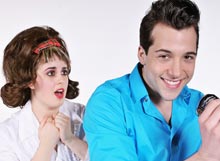Lowcountry Shakespeare founder and “Twelfth Night” director, Jeff Evans, discusses the troupe’s return from hiatus and how Falstaff (the character, not the beer) changed his life.
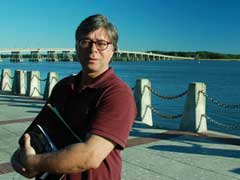 The October, 2010 production of “Twelfth Night” marks a long-awaited homecoming for Lowcountry Shakespeare to Beaufort’s Henry C. Chambers Waterfront Park. Lowcountry Weekly Publisher, Jeff Evans – or as we fondly refer to him “the guy who signs the checks” – formed the troupe in the mid 1990’s. Having played the likes of Iago and Macbeth on stage, this time around Evans chose the role of Director. Obviously hard questions had to be asked. In lieu of those, we had the following conversation on the magazine’s porch overlooking the park…
The October, 2010 production of “Twelfth Night” marks a long-awaited homecoming for Lowcountry Shakespeare to Beaufort’s Henry C. Chambers Waterfront Park. Lowcountry Weekly Publisher, Jeff Evans – or as we fondly refer to him “the guy who signs the checks” – formed the troupe in the mid 1990’s. Having played the likes of Iago and Macbeth on stage, this time around Evans chose the role of Director. Obviously hard questions had to be asked. In lieu of those, we had the following conversation on the magazine’s porch overlooking the park…
Mark Shaffer: Lowcountry Shakespeare’s been on hiatus for the last few years, so this is our first official interview on the subject. In fact, as far as I can say without being under oath, we’ve never spoken of it before. Ever. Fill me in on a little bit of the history. How and when did it all begin?
Jeff Evans: It began a while ago. It’s been fun.
(Long pause)
MS: I’m going to need more than that. I’ve got space to fill.
(Laughter)
JE: Oh, all right. I was one of those people who went through high school and college without reading Shakespeare. As an adult I find that kind of disturbing. I’d moved back to San Francisco and decided to take an acting class just for the hell of it and studied acting for a couple of years. Even then, I’d 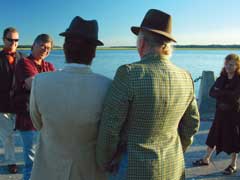 never seen or read Shakespeare. So, this girl that I’d met had tickets to see The Berkeley Shakespeare Festival do “Henry IV, Part I” and asked if I wanted to go. I said, “Yeah! I’ll follow you to the gates of hell. Sure I’ll go see Shakespeare with you.” (Laughter)
never seen or read Shakespeare. So, this girl that I’d met had tickets to see The Berkeley Shakespeare Festival do “Henry IV, Part I” and asked if I wanted to go. I said, “Yeah! I’ll follow you to the gates of hell. Sure I’ll go see Shakespeare with you.” (Laughter)
We were pretty close to the stage. I sat there and watched this guy do Falstaff and I was mesmerized by the performance. It looked like he was having so much fun. His character was so big. That night I thought I’ve got to learn how to do this. The actor turned out to be Michael McShane, a pretty well known actor in the Bay Area. He played Friar Tuck in Kevin Costner’s version of Robin Hood. But watching him on stage I just thought, oh my God, this is absolutely fantastic. Not many people can define one single moment when something really clicks – something you end up doing – and that was absolutely the moment I fell in love with Shakespeare.
MS: What was your first experience on stage with Shakespeare?
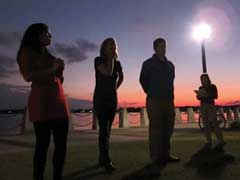 JE: Berkeley Shakespeare did a four or five month long apprentice program where you actually paid them to spend six hours a day doing classes like verse, scene study, movement, text work, stage combat – everything you could possibly imagine. At night you’d have little spear-carrier roles in the Main Stage productions. They did three plays in repertory, so the apprentices were constantly turning the stage from one show into another, doing the classes during the day and then doing little parts in the performances at night. At the end of the program all the apprentices got together and did their own production of a play directed by an actor in the main company. In my case that actor was a guy by the name of Bob Devin Jones, and Bob and I became friends. He was from L.A. I was from San Francisco. I moved here in 1992 and a few years later he ended up moving to St. Petersburg, Florida.
JE: Berkeley Shakespeare did a four or five month long apprentice program where you actually paid them to spend six hours a day doing classes like verse, scene study, movement, text work, stage combat – everything you could possibly imagine. At night you’d have little spear-carrier roles in the Main Stage productions. They did three plays in repertory, so the apprentices were constantly turning the stage from one show into another, doing the classes during the day and then doing little parts in the performances at night. At the end of the program all the apprentices got together and did their own production of a play directed by an actor in the main company. In my case that actor was a guy by the name of Bob Devin Jones, and Bob and I became friends. He was from L.A. I was from San Francisco. I moved here in 1992 and a few years later he ended up moving to St. Petersburg, Florida.
I was living in Bluffton and spending a lot of time in Hilton Head and I thought wow, somebody should do Shakespeare outside here. This place is great for that. And a few years later I thought wow, somebody should do Shakespeare outside here. This place is great for that. (Laughter)
I’d done a lot of set construction and other stuff, so I thought there might be a way to figure out how to do this, but I didn’t have the chops to direct Shakespeare. So I called Bob and said, “Hey, I want to do Shakespeare in Hilton Head. Want to come up and direct it?” And he said “Yeah.” I went out and shamelessly begged for money (which I still do) and we found some actors. That year (1998) we did “Romeo and Juliet” on one weekend and “Twelfth Night” on the next and we performed in the gazebo at the Shelter Cove Marina on Hilton Head. Now, when I think back on that, it just seems like insanity. But we did, and we started doing it every year, and it grew. It was kind of accidental. Pretty early on, I moved to Beaufort, and we started doing it here. And every year I’d bring Bob up to direct the plays. By this point, he’d made a pretty good career in the theater as an actor, director and writer – one of the few people I’ve ever known who’ve actually managed to make a living that way. His time got to be more and more precious and it was harder to get him up here. We’d be able to get him for four weeks. So we’d do an entire Shakespeare play – rehearsal to performance – in four weeks, which also seems like insanity now.
MS: Somehow it all works out.
JE: Somehow it happens. With his schedule and the expense of bringing him up, I just decided I had to direct it myself this year, which is the first time I’ve directed Shakespeare. And I’m really having fun.
MS: I’m hearing from some of the veteran players that this is something they’ve been waiting for, particularly since you directed “Arsenic and Old Lace” last fall. They’ve been curious to see how y ou’d approach Shakespeare.
ou’d approach Shakespeare.
JE: Well, I appreciate that. The last Shakespeare we did was about three years ago – “Two Gentlemen of Verona” – which was supposed to be in the park, but the park wasn’t ready. So we pushed it back and the park still wasn’t ready and Bob had to leave for about four weeks because of previous obligations. While he was gone I was running rehearsals and some of the actors – some that are in this production – were kind enough to say they liked the way I was directing. Although Bob gets a copy of Lowcountry Weekly so I’m a bit reluctant to mention this.
MS: Say “Hi” to Bob.
JE: Hi, Bob! How are you? (Laughter)
JE: Bob’s actually coming to the show. I will certainly appreciate it if he sees the play and really, really likes it. At this point I’ve known the guy for twenty years and he’s never seen anything I’ve directed, so to get his stamp of approval would mean a lot to me.
MS: Hopefully he’ll have more to say than “Nice costumes.” (Laughter)
JE: Right.
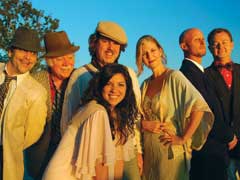 MS: This is the first time back in the park in a while as well as a return from hiatus. Why choose “Twelfth Night?”
MS: This is the first time back in the park in a while as well as a return from hiatus. Why choose “Twelfth Night?”
JE: Waterfront Park’s been rebuilt in the interim and I don’t think there’s another facility like it for a thousand miles up and down the coast. I believe that Beaufort truly is a jewel of a town and Waterfront Park is the diamond in the middle of the setting. I think Shakespeare should always be free, and if you can do it, it should always be outdoors. All of this stuff is four hundred years old, and it’s all still funny or tragic or thoughtful, but it’s always still meaningful. And with the work The Greenery’s done (I’ve got to get my plug in for those guys) the park looks absolutely glorious. There are a lot of moving parts to putting Shakespeare together and if I was going to crank it back up after a few years I wanted a romp in the park. Twelfth Night is definitely a romp in the park. Plus, not only is it still really funny but the script is full of dirty jokes and we’re mining every one we can and making some up as we go. (Laughter)
MS: It’s also littered with all sorts of subplots. There’s a whole lot going on. It’s complicated in a way.
JE: There are a number of plays where Shakespeare uses mistaken identity. In this case it’s a girl – Viola – who washes up on shore after a shipwreck and dresses as a man to make her way through. A lot of situations fall out of that. And there’s a character everyone else agrees is a complete jerk.
MS: Malvolio.
JE: Right. So they find a way to get back at him. There’s a scene where Malvolio’s so far removed 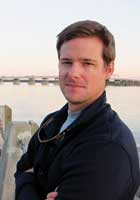 from his natural character that he’s actually in jail for being crazy. (Laughter)
from his natural character that he’s actually in jail for being crazy. (Laughter)
JE: At this point the fact that he’s in jail for being crazy makes the audience feel that maybe this prank’s been carried just a little too far. So there’s a certain sympathy for Malvolio even though he’s such a prig and nobody can stand him. Those are the two plots that kind of wind their way through the play – and it’s funny. There are scenes that are almost like the Three Stooges.
MS: I’d say more like The Marx Brothers, very smart and fast.
JE: Right, and we’re sort of setting it in the time period of the 1920’s or 1930’s. There’s a group of guys involved in the Malvolio plot I call The Gang of Drunks: Sir Toby Belch, Sir Andrew Aguecheek and some guy named Fabian who just sort of shows up halfway through 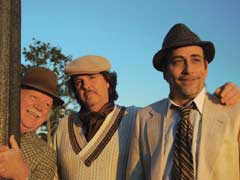 the play. Nothing, not a mention for the first half of the play and all of a sudden there he is.
the play. Nothing, not a mention for the first half of the play and all of a sudden there he is.
MS: Maybe Shakespeare sold the part to finance something – kind of like “Romeo and Juliet’s” character of the Apothecary for Mr. Fennyman in Shakespeare In Love. (Laughter)
MS: Perhaps he went about it in that way. “Why the play’s called ‘Fabian,’ of course, ‘Fabian and the Gang of Drunks.’ Good title.” (Laughter)
JE: “Fabian and Ethel, the Captain’s Daughter.”
MS: Better title. You’ve also cast the traditionally male role of Feste, the Countess Olivia’s fool – the wise fool – as a woman.
JE: Christine Smith, who’s playing Feste, played all the Fairies in “A Midsummer Night’s Dream” back in 2004 when she was still in high school. Now, she’s in her early 20’s, she’s married and has a child and she’s very good. She’s got this way about her that when she came to the audition it got me 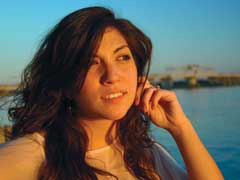 thinking that she could pull off the fool and it would really be fun. It’s proving to be just that. Like so many of Shakespeare’s clowns, Feste is also the character who actually knows more than anyone else about what’s really going on and Christine’s having fun doing it.
thinking that she could pull off the fool and it would really be fun. It’s proving to be just that. Like so many of Shakespeare’s clowns, Feste is also the character who actually knows more than anyone else about what’s really going on and Christine’s having fun doing it.
But you know, the funny thing about this is that it’s community theater – and these guys are good, they’re really good – but it’s still community theater. I try to pay actors. But the fact is they’re not in it for the money.
MS: They take it very seriously, particularly some of the veterans.
JE: I think Dave Falls and Fred Wilson are the two actors with whom I’ve worked the longest, next would be Michael Kane.
MS: The famous Michael Kane.
JE: The other Michael Caine. These guys are really good. I think this is our 12th or 13th production and I’m convinced this is the best casting we’ve ever had.
MS: The youngsters – like the twins, Viola and Sebastian (Lynleigh McLain and Elliott Chucta) haven’t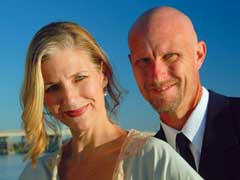 really done this kind of thing before.
really done this kind of thing before.
JE: No, they’ve done kid’s stuff.
MS: They’re coming from something like “High School Musical” to something much more complex and nuanced.
JE: But the fact is they’ve done enough stuff on stage that it’s different, but not so different. I talked to a lot of people about doing the role of the Sea Captain. It’s small, about thirty lines. But they were flipped out because it was Shakespeare. The reality is that the language is different, the syntax is a little funny, but it’s no different than doing “Arsenic and Old Lace.” Like anything else, you parse the lines and understand what you’re saying.
MS: This is a common thread among the actors with whom I’ve spoken: understanding the language. Fear of it is why so many people are intimidated by Shakespeare – it’s not our vernacular. It’s Elizabethan vernacular and verse.
JE: But the ideas aren’t any different. The vernacular may be different and the way the thoughts are organized may be different, but the thoughts themselves are no different from anything in Harold Pinter or David Mamet. Understand what you’re saying and listen to the other actors while you’re on stage. It all comes down to that.
William Shakespeare’s “Twelfth Night” is presented to the public free of charge in Beaufort’s Waterfront Park October 22, 23 and 24. An encore performance will take place at USCB’s New River Campus in Okatie on Wednesday, October 27 at 7 pm.


